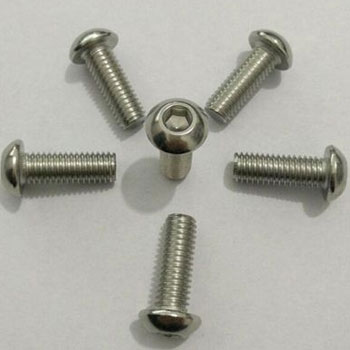Finding the Best Stove Bolt: A Comprehensive Review
Stove bolts, also referred to as machine screws, are an essential component in various DIY projects and repair tasks. Whether you’re an avid hobbyist or a professional, having the right assortment of nuts, bolts, and washers can make all the difference. To help you find the perfect stove bolt kit, we’ve scoured Amazon for the best options available. Below, we present our top five picks, complete with a brief summary and a list of pros and cons for each product.
To see our related product guide article, click here.
Top Picks for Best Stove Bolt
Mr. Pen – Stove Bolt Kit with Bolts, Nuts, and Washes, 113 pcs
If you’re seeking a compact yet versatile nuts and bolts assortment kit, look no further than the Mr. Pen offering. This kit includes a total of 113 pieces, featuring an assortment of nuts, bolts, and washers in various sizes. Whether you’re an amateur DIY enthusiast or a seasoned professional, this comprehensive set is designed to cover a wide range of projects with ease.
Pros:
- Compact and convenient case for easy organization and storage.
- Durable materials ensure longevity and reliability.
- Contains a good selection of sizes for versatile use.
Cons:
- Limited quantity compared to other kits on the market.
Besitu 720Pcs Machine Screw/Stove Bolt Assortment Kit with Case
For those in need of an extensive range of bolts and hardware, the 720-piece machine bolt screw assortment kit by Besitu is an excellent option. This kit provides an ample selection of stainless steel bolt screws, nuts, and flat washers in various sizes. Perfect for avid hobbyists and professionals alike, this kit ensures that you always have the right hardware at hand for any project.
Pros:
- Extensive range of sizes suitable for most applications.
- Sturdy stainless steel construction offers excellent corrosion resistance.
- The organized case keeps everything in order.
Cons:
- May contain more screws than necessary for occasional users.
Satantech 700Pcs Nut and Stove Bolt Assortment Kit with Case
If you’re in search of a comprehensive nuts and bolts assortment kit, the 700-piece option by an undisclosed brand is worth considering. Featuring a selection of stainless steel bolts, nuts, and flat washers in popular sizes, this kit ensures you have the essential hardware at your disposal for a wide range of DIY and repair tasks.
Pros:
- High-quality stainless steel construction ensures durability.
- Ample quantity for multiple projects.
- Case keeps all components neatly arranged.
Cons:
- Some users may prefer more specialized sizes.
T.K.Excellent Machine Screw/Stove Bolt, Hex Nut, Flat Washer Assortment Kit, 405 Pcs
For those who value versatility and flexibility, the T.K.Excellent machine screw/stove bolt and hex nut assortment kit is an ideal choice. This 405-piece combo stove bolt assortment kit provides a range of machine screws/stove bolts, hex nuts, and flat washers in various sizes, allowing you to tackle a diverse array of projects with ease.
Pros:
- Combo drive design allows flexibility with different screwdriver types.
- Suitable for a variety of applications.
- Comes in a compact case for easy storage.
Cons:
- May not have as many pieces as other kits on this list.
Hillman 1737 10-24 x 3 in. Round Head Slotted Stove Bolt with Nut 20-Pack
For those seeking specific stove bolts with accompanying nuts, the Hillman 1737 10-24 x 3 in. round head slotted stove bolt 20-pack is an excellent option. This kit provides you with precisely what you need for your project, sparing you from searching through an assortment of pieces.
Pros:
- High-quality materials ensure reliable performance.
- Perfect for specific projects requiring this particular size and type.
- Ideal for quick, small-scale jobs.
Cons:
- Not a comprehensive assortment kit, limited to one size.
What Should You Look for in a Stove Bolt?
When choosing a stove bolt for your projects, there are several important factors to consider to ensure that you get the right type and size for your specific needs. Here are the key things you should look for in a stove bolt:
- Size and Length: Stove bolts come in various sizes and lengths. Consider the specific requirements of your project and choose the appropriate bolt size and length accordingly. It’s essential to select a bolt that provides enough threading to securely fasten the materials without being too long, which can lead to unnecessary protrusion.
- Material: Stove bolts are commonly made from different materials, including steel, stainless steel, brass, or zinc-plated steel. The material choice can impact the bolt’s strength, corrosion resistance, and overall durability. Select a material that matches the environmental conditions in which the bolt will be used and the load-bearing requirements of your project.
- Head Type: Stove bolts typically have round, flat, or oval heads. The head type will determine the method of installation, whether it requires a slotted or Phillips screwdriver. Consider the specific needs of your project and the tools you have available to choose the appropriate head type.
- Drive Type: The drive type refers to the shape of the indentation on the bolt’s head for accommodating the screwdriver. Common drive types include slotted, Phillips, combo, and hex (Allen) drives. Ensure that the drive type matches the tools you have or are willing to acquire for the installation process.
- Thread Type: Stove bolts may have coarse or fine threads. Coarse threads are typically more common and provide better holding power in soft materials, while fine threads are suitable for harder materials and offer smoother engagement.
- Nut Compatibility: Check that the stove bolt is compatible with the type of nut you plan to use. For instance, a stove bolt with a machine thread is designed to be used with a corresponding nut, while a wood screw thread is meant for use directly into wood.
- Quantity: Consider the number of stove bolts you need for your project. Some bolts come in assortments or packs, while others are sold individually. Make sure to get the right quantity to complete your project without running short.
- Application: Determine the specific application of the stove bolt. Some projects may require specialized bolts, such as carriage bolts for specific types of fastening needs or eye bolts for creating attachment points for cables or wires.
- Quality: Opt for stove bolts of high-quality construction. Quality bolts are less likely to strip, break, or corrode over time, ensuring a secure and long-lasting installation.
- Kit or Individual Purchase: Decide whether you need an assortment kit with a variety of bolts, nuts, and washers or if you prefer to purchase individual bolts separately based on your project’s unique requirements.
By considering these factors, you can select the right stove bolt for your project, ensuring a secure and successful outcome.
Frequently Asked Questions
What is the difference between a carriage bolt and a stove bolt?
Carriage bolts and stove bolts are two different types of bolts, each designed for specific applications and having distinct features. To read our related article on carriage bolts, click here. Here are the main differences between carriage bolts and stove bolts:
Carriage Bolt:
- Head Shape: Carriage bolts have a round, domed head with a square section directly beneath it. The square section is designed to prevent the bolt from spinning when tightened, making it suitable for applications where one side of the connection is inaccessible.
- Neck: Carriage bolts have a smooth, non-threaded neck, also known as a shank, between the head and the threading. This smooth section helps reduce friction against the material during installation.
- Installation: To install a carriage bolt, a hole is first drilled through the materials being fastened. Then, the bolt is inserted into the hole from one side, and a washer and nut are added on the other side to secure the bolt in place.
- Common Use: Carriage bolts are commonly used for applications where the bolt head is required to be flush with the surface or for fastening materials together in situations where access is limited on one side.
Stove Bolt:
- Head Shape: Stove bolts have a flat or round head with a slotted or Phillips drive recess. The head is usually wider than the bolt’s diameter, providing a larger bearing surface for distributing loads.
- Thread: Stove bolts have threading that extends from the head to the tip, allowing them to be fully threaded into the materials being fastened.
- Installation: Stove bolts are typically used with nuts and washers. They are inserted through pre-drilled holes in the materials to be joined, and a nut is threaded onto the bolt from the opposite side to hold the materials together securely.
- Common Use: Stove bolts are versatile and commonly used in various woodworking, metalworking, and general construction applications. They are often used in conjunction with nuts and washers to provide a strong and reliable connection.
In summary, the main difference between carriage bolts and stove bolts lies in their head shape, neck (or lack thereof), and the method of installation. Carriage bolts have a distinctive square section under their domed head and are used for applications where the head needs to be flush with the surface and to prevent spinning during installation. Stove bolts, on the other hand, have a fully threaded shank and are commonly used with nuts and washers for various general fastening needs.
What is the strongest stove bolt material?
The strength of a stove bolt depends on the material from which it is made. The strongest stove bolt material is generally considered to be stainless steel. Stainless steel is an alloy composed of iron, carbon, and various other elements, with the addition of chromium being a key component that gives stainless steel its corrosion-resistant properties.
Here’s why stainless steel is often considered the strongest stove bolt material:
- High Tensile Strength: Stainless steel has excellent tensile strength, which means it can withstand high amounts of pulling or stretching force without breaking or deforming. This characteristic makes stainless steel stove bolts suitable for applications requiring strong and durable connections.
- Corrosion Resistance: Stainless steel is highly resistant to corrosion and rust, even in harsh environments or when exposed to moisture. This corrosion resistance ensures that the bolt retains its strength and integrity over time, making it ideal for outdoor or marine applications.
- Temperature Resistance: Stainless steel maintains its strength and mechanical properties at a wide range of temperatures, from extreme cold to high heat, without losing structural integrity.
- Non-Magnetic: Some grades of stainless steel are non-magnetic, making them suitable for specific applications where magnetism might interfere with the equipment or materials being used.
- Durability: Stainless steel stove bolts are long-lasting and can withstand repeated use without losing their structural integrity or mechanical properties.
While stainless steel is considered the strongest material for stove bolts, it’s essential to select the right grade of stainless steel for your specific application. The most common stainless steel grades for stove bolts include 18-8 stainless steel (Type 304), which offers a good balance of strength and corrosion resistance, and 316 stainless steel, which provides even higher corrosion resistance, making it ideal for marine and coastal applications.
It’s worth noting that there are other high-strength materials used in specialized applications, such as alloy steel stove bolts with specific heat treatments or coatings, but stainless steel remains one of the most widely used and reliable options for general-purpose stove bolts due to its overall strength, corrosion resistance, and versatility.
Is a stainless-steel stove bolt heat resistant?
Stainless steel bolts are generally heat-resistant up to a certain temperature, but the level of heat resistance depends on the specific grade of stainless steel used. Stainless steel is a broad term that encompasses a wide range of alloys, each with its own unique properties, including heat resistance.
The two most common grades of stainless steel used for bolts are:
- Austenitic Stainless Steel (e.g., AISI 304 and AISI 316): Austenitic stainless steels are widely used in various applications, including bolts. They offer good corrosion resistance and are suitable for use in environments with moderate heat, such as room temperature to around 800°C (1472°F). These stainless steels retain their strength and mechanical properties within this temperature range. However, they may start to lose some strength and ductility at higher temperatures.
- Ferritic Stainless Steel (e.g., AISI 430): Ferritic stainless steels have lower nickel content than austenitic grades, making them less resistant to corrosion but more resistant to heat. They can withstand higher temperatures, typically up to around 815°C (1499°F), before experiencing significant loss of strength and other mechanical properties.
It’s essential to check the manufacturer’s specifications or consult with a materials engineer to determine the specific heat resistance of the stainless steel bolts you are considering. Different applications may require different grades of stainless steel to ensure the bolts perform well under specific temperature conditions.
For applications involving extremely high temperatures, such as in industrial furnaces or gas turbines, specialized heat-resistant alloys like Inconel or Hastelloy are typically used. These alloys are specifically engineered to withstand extreme heat, making them more suitable for such demanding environments.
In summary, stainless steel bolts are generally heat-resistant up to a certain temperature, but their performance at high temperatures varies depending on the specific grade of stainless steel used. For applications involving elevated temperatures beyond the capabilities of standard stainless steel, it’s crucial to select the appropriate heat-resistant alloy that matches the required temperature range and environmental conditions.
editor's pick
news via inbox
Stay one step ahead with exclusive tips, guides, and offers delivered directly to your inbox.
Sign up for our newsletter and elevate your home improvement game today!







